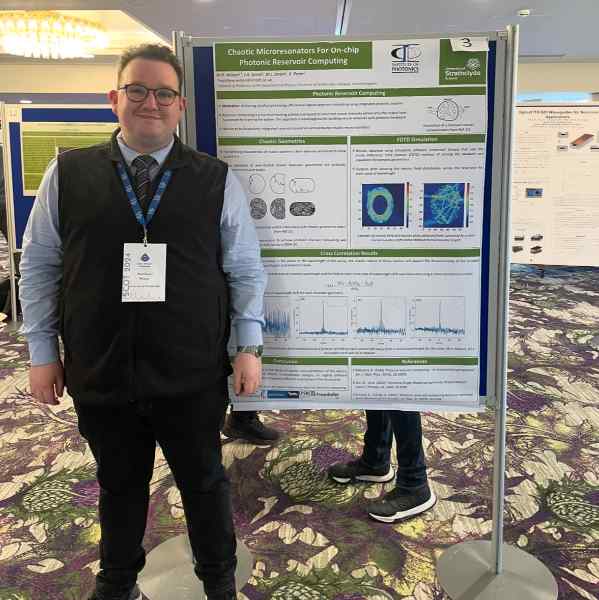PhD PhysicsMatt Wilson
Why did you choose Strathclyde for your postgraduate research study?
Having completed the MPhys Physics course within the Department of Physics, I was able to see first-hand the dedication to teaching that the academic staff in the department have and the abundant research talent and facilities available. My favourite area of physics is photonics, this encouraged me further to choose the Institute of Photonics (IoP) at Strathclyde for a PhD as there exists a world-class research facility within the university.

What is the nature of your research and what do you like about it?
My research is in the development of new machine learning (ML)/artificial intelligence (AI) enabling technologies that operate based on photonic integrated circuit hardware.
What I like the most about my research is that I can use my passion for photonic technologies to create the next generation of ML/AI systems. It has allowed me to build a broad range of useful practical skills such as optical simulation, microfabrication, device characterisation and running optical experiments.
What’s the Strathclyde research community like?
Strathclyde’s research community is a very inclusive one, where collaboration between colleagues is highly encouraged. Within the Institute of Photonics and Department of Physics we have access to a range of events. We have educational events, for example, the Strathclyde Physics Society’s annual guest lecture series and the John Anderson Colloquia. We also have a number of social events, for example, the annual Institute of Photonics BBQ and Christmas party, as well as events run by the student led group Strathclyde Optics, Physics and Engineering Society.
What are the Strathclyde facilities like?
Strathclyde has fantastic research facilities. At the Institute of Photonics for example, we have an in-house microfabrication cleanroom where PhD students can learn to make their own photonic integrated circuits for experiments. This helps us to rapidly prototype new devices on a range of material platforms. We also have access to a range of state-of-the-art optical labs containing advanced laser systems, quantum technology testbeds, high speed opto-electronics and next generation neurotechnology development labs.
What are your ambitions for the future and how do you think your time at Strathclyde will help you achieve your goals?
My ambitions for the future are to pursue a career in academic research. The guidance and support that supervisory staff have provided has been instrumental in allowing me to develop as a researcher in my field and encouraged me to pursue this career option. I am also interested in lecturing. So far, I have had the ability to combine teaching (in the form of leading undergraduate tutorial sessions) with my own research activities, giving me invaluable hands-on experience.
What would you say to anyone thinking of coming to study at Strathclyde?
You will be joining a friendly and collegiate environment. Staff at the Institute of Photonics and Department of Physics can be easily contacted to discuss opportunities and potential projects. In short: do it, you won’t regret it!
Find out more